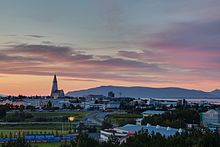Portal:Business
The Business and Economics Portal Business is the practice of making one's living or making money by producing or buying and selling products (such as goods and services). It is also "any activity or enterprise entered into for profit." A business entity is not necessarily separate from the owner and the creditors can hold the owner liable for debts the business has acquired. The taxation system for businesses is different from that of the corporates. A business structure does not allow for corporate tax rates. The proprietor is personally taxed on all income from the business. A distinction is made in law and public offices between the term business and a company such as a corporation or cooperative. Colloquially, the terms are used interchangeably. (Full article...) Economics (/ˌɛkəˈnɒmɪks, ˌiːkə-/) is a social science that studies the production, distribution, and consumption of goods and services. Economics focuses on the behaviour and interactions of economic agents and how economies work. Microeconomics analyses what's viewed as basic elements in the economy, including individual agents and markets, their interactions, and the outcomes of interactions. Individual agents may include, for example, households, firms, buyers, and sellers. Macroeconomics analyses the economy as a system where production, distribution, consumption, savings, and investment expenditure interact, and factors affecting it: factors of production, such as labour, capital, land, and enterprise, inflation, economic growth, and public policies that have impact on these elements. (Full article...) Selected articleThe economy of the Han dynasty (206 BC – 220 AD) of ancient China experienced upward and downward movements in its economic cycle, periods of economic prosperity and decline. It is normally divided into three periods: Western Han (206 BC – 9 AD), the Xin dynasty (9–23 AD), and Eastern Han (25–220 AD). The Xin regime, established by the former regent Wang Mang, formed a brief interregnum between lengthy periods of Han rule. Following the fall of Wang Mang, the Han capital was moved eastward from Chang'an to Luoyang. In consequence, historians have named the succeeding eras Western Han and Eastern Han respectively. The Han economy was defined by significant population growth, increasing urbanization, unprecedented growth of industry and trade, and government experimentation with nationalization. Another large component of the government is that it was run by influential families who had the most money. In this era, the levels of minting and circulation of coin currency grew significantly, forming the foundation of a stable monetary system. The Silk Road facilitated the establishment of trade and tributary exchanges with foreign countries across Eurasia, many of which were previously unknown to the people of ancient China. The imperial capitals of both Western Han (Chang'an) and Eastern Han (Luoyang) were among the largest cities in the world at the time, in both population and area. Here, government workshops manufactured furnishings for the palaces of the emperor and produced goods for the common people. The government oversaw the construction of roads and bridges, which facilitated official government business and encouraged commercial growth. Under Han rule, industrialists, wholesalers, and merchants—from minor shopkeepers to wealthy businessmen—could engage in a wide range of enterprises and trade in the domestic, public, and even military spheres. Selected image
Selected economyThe economy of Iceland is small and subject to high volatility. In 2011, gross domestic product was US$12 billion, but by 2018 it had increased to a nominal GDP of US$27 billion. With a population of 387,000, this is $55,000 per capita, based on purchasing power parity (PPP) estimates. The 2008–2011 Icelandic financial crisis produced a decline in GDP and employment that has since been reversed entirely by a recovery aided by a tourism boom starting in 2010. Tourism accounted for more than 10% of Iceland's GDP in 2017. After a period of robust growth, Iceland's economy is slowing down according to an economic outlook for the years 2018–2020 published by Arion Research in April 2018. Iceland has a mixed economy with high levels of free trade and government intervention. However, government consumption is less than other Nordic countries. Hydro-power is the primary source of home and industrial electrical supply in Iceland. (Full article...) Selected quote"As every individual, therefore, endeavours as much as he can both to employ his capital in the support of domestic industry, and so to direct that industry that its produce may be of the greatest value; every individual necessarily labours to render the annual revenue of the society as great as he can. He generally, indeed, neither intends to promote the public interest, nor knows how much he is promoting it. By preferring the support of domestic to that of foreign industry, he intends only his own security; and by directing that industry in such a manner as its produce may be of the greatest value, he intends only his own gain, and he is in this, as in many other cases, led by an invisible hand to promote an end which was no part of his intention. Nor is it always the worse for the society that it was no part of it. By pursuing his own interest he frequently promotes that of the society more effectually than when he really intends to promote it. I have never known much good done by those who affected to trade for the public good. It is an affectation, indeed, not very common among merchants, and very few words need be employed in dissuading them from it."
TopicsRelated WikiProjectsDid you know (auto-generated) -
On this day in business history
General imagesThe following are images from various business-related articles on Wikipedia.
More did you know
Business news Wikinews Economy and business portal
|







































